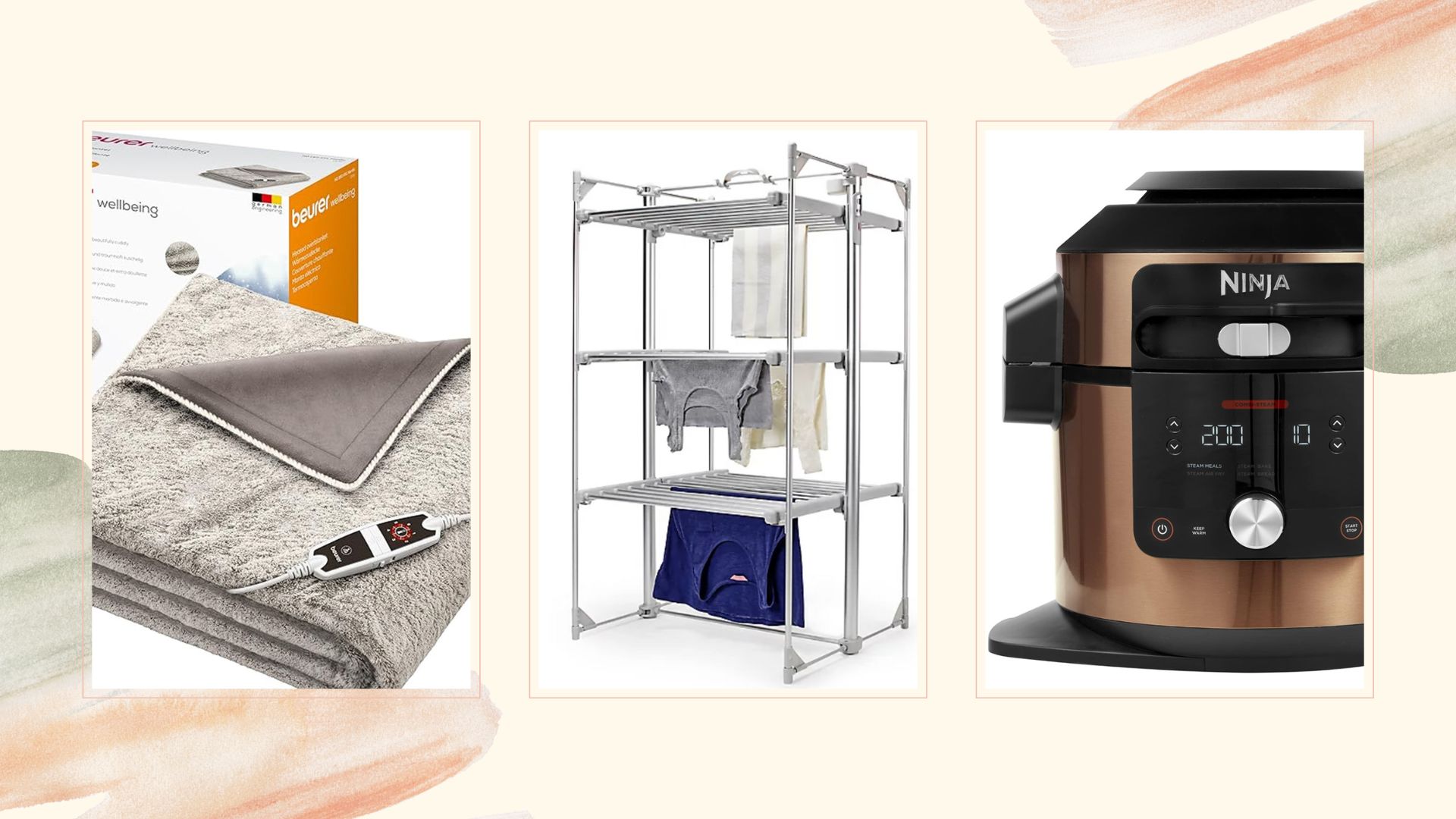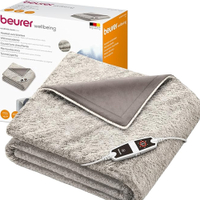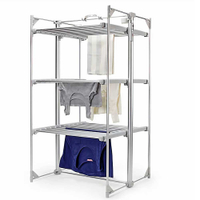6 winter essentials you should buy for your home in this year's Black Friday sales
As a homes editor, these are the genuine home appliance discounts I think are worth buying


There's no denying that Black Friday deals can feel somewhat overwhelming and sometimes not much of a deal at all?! But don't let that put you off because there are some huge savings out there, it's just about knowing where to look – our pick of the best Black Friday home appliance deals is a good place to start.
As a lifestyle editor, I spend a lot of time perusing home appliances and reviewing the latest products on the market. As a result, I have a greater understanding of when Black Friday discounts are worth shopping for.
We have been watching the best Black Friday dehumidifier deals to see what's on offer, because we know everything you need to know before buying a dehumidifier so can see what's a good deal or not.
And of course, we've tested the best-heated airers and best electric blankets on the market so we know if these winter essential discounts are good, rather than merely discounted.
These are the items I recommend as genuinely good discounts on highly sought-after homewares to see you through winter...
Our home appliance deals quick list
If you want to secure our recommended discounts quicker, here's a helpful list of all the retailers with their active Black Friday discounts...
- Appliances Direct: Save £202 on MeacoDry ABC 10L Dehumidifier
- Amazon: Save £35 when buying the Beurer XXL Cosy Nordic Electric Blanket
- Amazon: Save £110 on Ninja's most expensive air fryer, now £199
- Argos: Best discount we've seen for Sage's Bambino Plus coffee machine, save £70
- Lakeland: £100 off 5-star rated best-selling heated clothes airers
- Screwfix: Over 20% off the smart Google Nest thermostat
Black Friday home appliance deals: winter essentials
Meaco MeacoDry ABC 10L Dehumidifier: Was £329 Now £127.98 at Appliances Direct (save £202)
Having carried out a comprehensive MeacoDry ABC 12L Dehumidifier review we can vouch for how good this appliance is. We can say with absolute authority that this is a genuine discount on a highly-rated home appliance.
One of our favourite features of the MeacoDry is its water tank which features a lid, meaning it is easy to empty, as water can't slosh out as the tank is pulled out and carried to the sink. Given it can extract up to 10 litres a day, that's handy.
Beurer HD150 XXL UK Cosy Nordic Electric Blanket: was £109.99, now £72.99 at Amazon (save £35)
Another highly practical buy for the winter ahead is a heated throw to heat yourself rather than the whole house, in an attempt to keep energy bills down.
This cosy blanket has a faux-fur side and a fleece side, it's almost undetectable as a heating aid when thrown over the sofa. It's big enough for two to snuggle under and, with a saving like this, it's irresistible. Read more in our full review.
I was always hesitant about how much it costs to run an electric blanket but it turns out it's pennies, so it makes logical sense to stay warm for less with a heated throw this winter.
Ninja Foodi Max 14-in-1 Air Fryer: was £309.99, now £199 at Amazon (save £110)
Now is THE time to bag a deal on a best-selling air fryer, especially one of the most expensive of Ninja's best air fryers. With how much it costs to run an airier vs an oven, this is a winter essential for saving energy.
If you want your air fryer to be hard-working, this is the one to go for. It can slow cook, bake, steam, grill, and pressure cook as well as air fry like the best models on the market. The discount applies to the copper/black model but we happen to think it looks more chic in this warm metallic finish.
Dry:Soon Deluxe 3-Tier Heated Airer was £249 now £149.99 at Lakeland
As voted by us as the best heated clothes airer overall this Lakeland best-seller now has £100 off. – better than last year's Black Friday offer of £159.99. Upgrading your system for drying clothes indoors is ideal now to handle winter washing loads – plus you can utilise the savings to run a heated clothes airer instead.
Several members of the w&h team have this model, read our full Dry:Soon Deluxe 3-Tier Heated Airer review to see their thoughts, so I am confident when I say it's a resounding winner and worth spending the money on.
Sage Bambino Plus Coffee Machine: was £370 now £300 at Argos (save £70)
More of an all-season essential but still, I have wanted a Sage coffee machine for years, but have been holding out because a) they are expensive and b) I have been waiting to see if any brand knocked them off the top spot of being the best coffee machine. But right now Sage is still top.
This model is small but mighty, with Sage's famous 9-bar extraction method and 'ThermoJet' heating system that delivers barista-style coffee in the comfort of your own home. Read our full Sage Bambino Plus Coffe Machine review for more info.
This deal is on the black design but you can pick up the Sage Bambino Plus Coffee Machine at John Lewis for £349. The same models retail for £399.95 when you buy directly from Sageappliances.com.
Google Nest 3rd Gen Wireless Heating & Hot Water Smart Thermostat, was £188.97 now £144 at Screwfix (save £44.97)
It's a good time to make smart home choices for saving energy in the home, i.e. control your heating and hot water remotely and be able to check energy usage at the opening of an app. The Nest thermostat is currently on sale, offering a saving that can count towards the electrical installation.
What home appliances are worth buying in the Black Friday sales
Because more and more retailers now offer Black Friday sales it can be hard to judge what is worth buying. I would say that it's worth buying any of the most sought-after appliances and general best-sellers if they are on offer.
Sign up to our free daily email for the latest royal and entertainment news, interesting opinion, expert advice on styling and beauty trends, and no-nonsense guides to the health and wellness questions you want answered.
If the items in question are best-sellers (which we know from experience and behind-the-scenes intel) it means the discounts are genuine because the products would fly off the shelf even at all prices.
Any of the following are worth buying in the Black Friday sales...
- Best dehumidifier: Why should you buy a dehumidifier? This handy household appliance has become a must-have for dealing with humidity in our homes. Because they are often expensive now is the perfect time to bag a bargain. Plus it's the right time of year because condensation on windows is more of a problem in winter
- Best air fryers: The cooking appliance continues its reign as King of the modern-day kitchen. Consult our list of the best to ensure you are getting your money's worth because it is always worth buying an air fryer so the best price possible is a win.
- Best KitchenAid Black Friday deals: Step up your cooking and baking appliances for less with the best KitchenAid Black Friday deals. We watch for the best deals on offer because the prices are expensive to start with so right now is worth buying them at a discounted price.
- Best weighted blanket sales: Not the same as electric blankets but still a highly sought-after sleep aid that is an investment because they are not cheap and therefore now is a good time to secure the best price.
- Best Le Creuset Black Friday deals: Not technically home appliances but because we adore Le Creuset, as much as we are happy to use Aldi cast iron cookware there's something highly desirable about owning the iconic French brand of kitchenware.
And if it's an area of home appliances or accessories you know you need but are not entirely sure what to buy try cross-referencing the items on our buying guides to see if an item that we highly recommend is discounted.
For instance, whether you want one of the best induction pans or the best thin pillows consult our curated shopping edits to get a sense of what you want first so you can ascertain if the deals are worthwhile.
I'm well known among my peers for saying "It's only a good deal if you were planning to spend the money anyway" meaning if you would have bought the item at full price then you are benefitting a saving. I would steer clear of impulse buys and make use of the Black Friday discounts for the items on your shopping wish list that are now cheaper.

Tamara is a highly experienced homes and interiors journalist with a career spanning over 22 years. Now the Lifestyle Editor of womanandhome.com, she previously spent 18 years working with the style teams at Country Homes & Interiors and Ideal Home. With these award-winning interior teams, she gained a wealth of knowledge and honed her skills and passion for styling and writing about every aspect of lifestyle and interiors.
A true homes and interiors expert, Tamara has been an ambassador for leading interior brands on multiple occasions, including appearing on Matalan’s The Show and presenting at top interior trend forecasting events such as the Autumn Fair and Spring Fair.





